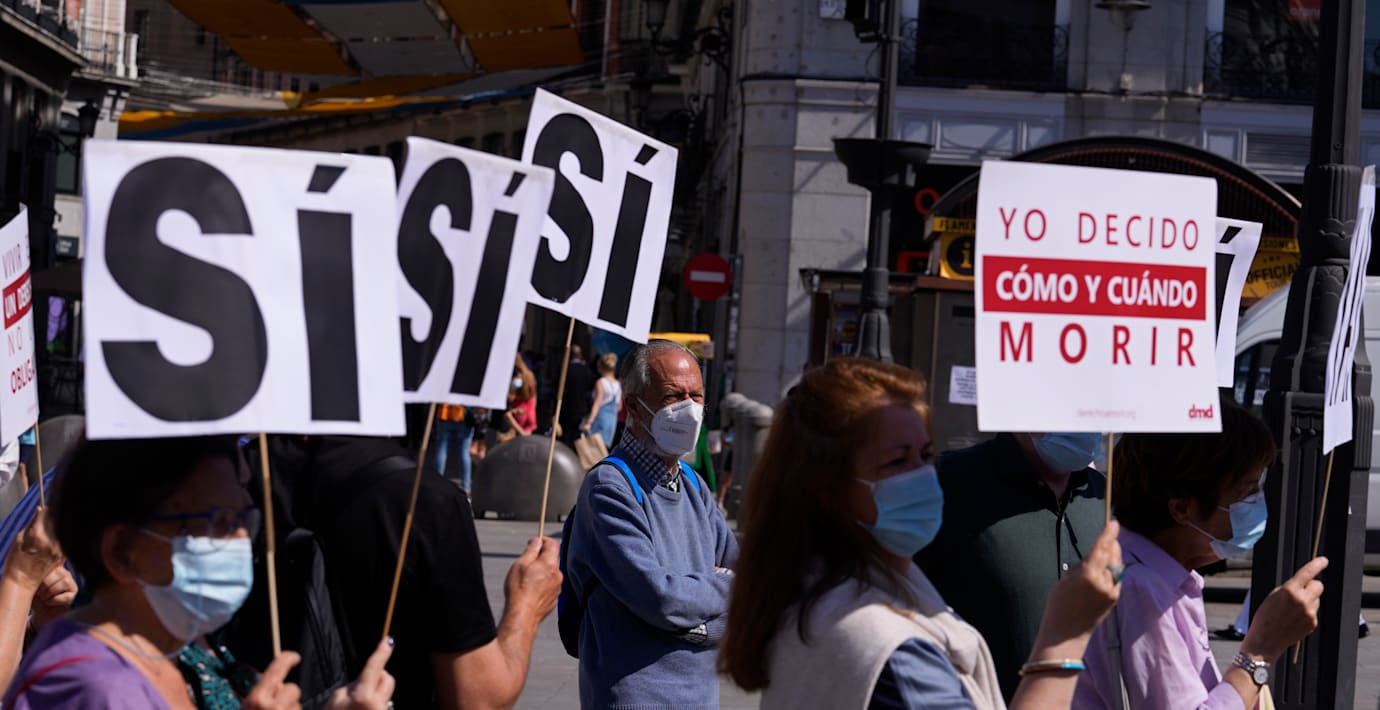
Hon är först att få dödshjälp utan att vara dödligt sjuk
51-åriga colombianskan Martha Sepúlveda fick diagnosen ALS 2018. I morgon, söndag, planerar hon att dö med hjälp av aktiv dödshjälp.
Hon blir den första i Colombia som inte är dödligt sjuk att få det, rapporterar Washington Post. Dödshjälp har erbjudits i landet sedan 1997 och i somras klubbades att även de som ”lider intensivt, fysiskt eller mentalt, på grund av en kroppslig skada eller obotlig sjukdom” har rätt till det.
– Jag vet att Gud äger mitt liv. Men Gud vill inte se mig lida, säger Sepúlveda, som är troende katolik, till Caracol News.
bakgrund
Amyotrophic lateral sclerosis
Wikipedia (en)
Amyotrophic lateral sclerosis (ALS), also known as motor neurone disease (MND) or Lou Gehrig's disease, is a neurodegenerative disease that results in the progressive loss of motor neurons that control voluntary muscles. ALS is the most common type of motor neuron disease. Early symptoms of ALS include stiff muscles, muscle twitches, and gradual increasing weakness and muscle wasting. Limb-onset ALS begins with weakness in the arms or legs, while bulbar-onset ALS begins with difficulty speaking or swallowing. Half of the people with ALS develop at least mild difficulties with thinking and behavior, and about 15% develop frontotemporal dementia. Most people experience pain. The affected muscles are responsible for chewing food, speaking, and walking. Motor neuron loss continues until the ability to eat, speak, move, and finally the ability to breathe is lost. ALS eventually causes paralysis and early death, usually from respiratory failure.Most cases of ALS (about 90% to 95%) have no known cause, and are known as sporadic ALS. However, both genetic and environmental factors are believed to be involved. The remaining 5% to 10% of cases have a genetic cause linked to a history of the disease in the family, and these are known as familial ALS. About half of these genetic cases are due to one of two specific genes. ALS and frontotemporal dementia (FTD) are considered to be part of a common disease spectrum (ALS-FTD) because of genetic, clinical, and pathological similarities. The underlying mechanism involves damage to both upper and lower motor neurons; in ALS-FTD, neurons in the frontal and temporal lobes of the brain die as well. The diagnosis is based on a person's signs and symptoms, with testing done to rule out other potential causes.There is no cure for ALS yet, and treatment is targeted at improving the symptoms. A medication called riluzole may extend life by about two to three months. Non-invasive ventilation may result in both improved quality and length of life. Mechanical ventilation can prolong survival but does not stop disease progression. A feeding tube may help. The disease can affect people of any age, but usually starts around the age of 60 and in inherited cases around the age of 50. The average survival from onset to death is two to four years, though this can vary, and about 10% survive longer than 10 years, and death is usually due to respiratory failure. In Europe, the disease affects about two to three people per 100,000 per year. Rates in much of the world are unclear. In the United States, it is more common in white people than black people.Descriptions of the disease date back to at least 1824 by Charles Bell. In 1869, the connection between the symptoms and the underlying neurological problems was first described by French neurologist Jean-Martin Charcot, who in 1874 began using the term amyotrophic lateral sclerosis. It became well known in the United States in the 20th century when in 1939 it affected baseball player Lou Gehrig and later worldwide following the 1963 diagnosis of cosmologist Stephen Hawking. The first ALS gene was discovered in 1993 while the first animal model was developed in 1994. In 2014, videos of the Ice Bucket Challenge went viral on the Internet and increased public awareness of the condition.
Omni är politiskt obundna och oberoende. Vi strävar efter att ge fler perspektiv på nyheterna. Har du frågor eller synpunkter kring vår rapportering? Kontakta redaktionen

